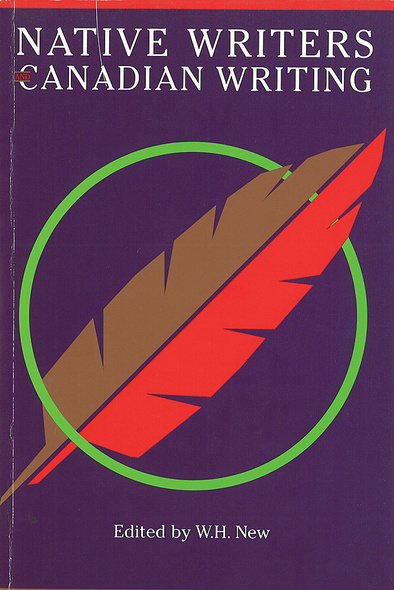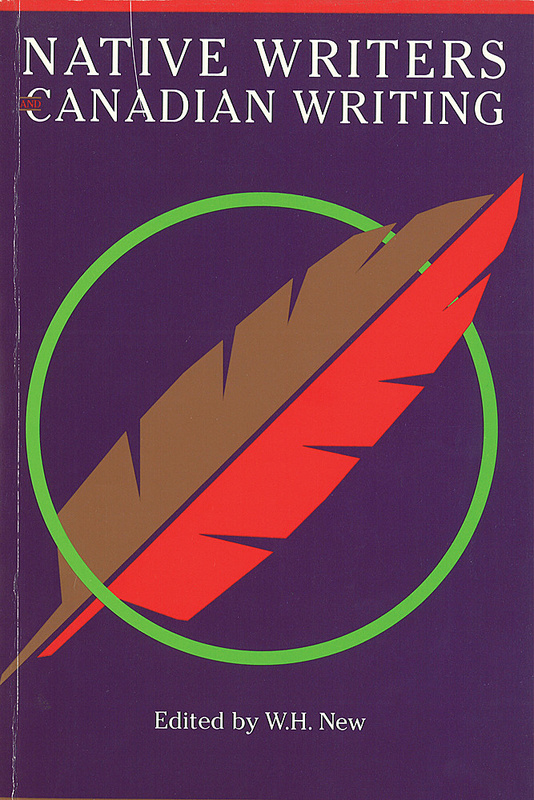Sometimes people are willing to listen only to those voices that confirm the conventions they already know. The unfamiliar makes them fear. Or makes them condescend. Neither fear nor condescension encourages listening. And no one who does not listen learns to hear.
– W.H. New, “Learning to Listen.”
Native Writers and Canadian Writing is a co-publication with Canadian Literature – Canada's foremost literary journal – of a special double issue which focuses on literature by and about Canada’s Native peoples and contains original articles and poems by both Native and non-Native writers. These not only reflect the growing prominence of contemporary Native writing but also direct the reader to the traditional literature from which it springs and which has been largely misunderstood by the non-Native community – myths, rituals, and songs having been interpreted more often as artistic “curiosities” rather than the masterworks of a different culture.
Essays examining the conventional portrayals of Native people in literature touch on works which range from the eighteenth-century journals of explorer Alexander Mackenzie, to the novels of James Fenimore Cooper, and to early writers in Canada such as historian-humourist Thomas Chandler Haliburton. Studies of Native literature focus on the oral literary traditions of the Haida and Inuit and their transcribers and on modern works by playwright Tomson Highway and authors Lee Maracle and Thomas King, among others. These commentaries illuminate the way in which Native writers view themselves and their disparate worlds, their gifts for pathos, humour, and self-parody, and their search for their own voices and distinct forms of communication.
Viewing Canada’s Native peoples in historical, anthropological, and political contexts, the book exposes prejudices and misconceptions entrenched since colonial days regarding Native societies and their moral, spiritual, and political values – values embodied in their hereditary literature. Just as Native visual art has flourished in recent years, the book records the initiatives now being taken by Native societies to preserve and promote their own cultural identity through the spoken and written word. These include control of their own education, creative writing programs, projects to preserve still extant languages, folklore, songs, and rituals, and the founding of Native publishing houses. Not only are these endeavours valuable contributions to tribal cultures, but they also contribute to the past and ongoing literary heritage of Canada as a nation. Recognition of the place of Native literature as an integral part of the Canadian cultural scene is one of the main goals of Native Writers and Canadian Writing. As W.H. New points out, this collection is “a speaking place ... a series of opportunities to begin listening.”
Native Writers and Canadian Writing has been produced as one of the projects celebrating the 75th anniversary of the University of British Columbia.
Its commentary and essays are well selected and organized to give context and meaning to the native writing presented.
English professor W.H. New has compiled an impressive collection of current perspectives on native writers who have assumed some measure of prominence ... as well as some fresh looks at voices from the past.
Native Writers and Canadian Writing is so sweeping in its scope and ambition that it creates a kind of spiritual universe of its own, an enchanting place that a reader does not want to leave. Each piece in this breathtaking anthology leads to another ... With the rising at Oka last summer, and what seems the continuing deafness of both Ottawa and Quebec to native concerns, this exhortation to listen is timely. But Native Writers and Canadian Writing is not about immediate political concerns. It provides a context that goes beyond the nightmare of history to timeless human values ... The question of non-natives writing about native subjects is dealt with but on the level of the deep sub-conscious, where many qualities of humanity are the same. The native spirit informs the Americas, and these essays and poems allow us to touch all who once walked the land we all walk ... The spirit of both the men and women in this anthology, the living and the dead, has a transformational magic that can touch us all.
Editorial: Learning to Listen
Articles
One Generation from Extinction / Basil H. Johnston
Reassessing Traditional Inuit Poetry / Robin McGrath
That Also Is You: Some Classics of Native Canadian Literature / Robert Bringhurst
“A Parcel of Whelps”: Alexander Mackenzie among the Indians / Parker Duchemin
Savage, Degenerate, and Dispossessed: Some Sociological, Anthropological, and Legal Backgrounds to the Depiction of Native Peoples in Early Long Poems on Canada / D.M.R. Bentley
Red & White Men; Black, White & Grey Hats: Literary Attitudes to the Interaction between European and Native Canadians in the First Half of the Nineteenth Century / Mary Lu Macdonald
Mourning Dove’s Canadian Recovery Years, 1917-1919 / Alanna Kathleen Brown
Contemporary Native Women’s Voices in Literature / Agnes Grant
Equality among Women / Mingwon Mingwon (Shirley Bear)
Jeannette Armstrong & the Colonial Legacy / Noel Elizabeth Currie
Yin Chin / Lee Maracle
Upsetting Fake Ideas: Jeannette Armstrong’s “Slash” and Beatrice Culleton’s “April Raintree” / Margery Fee
The Politics of Representation: Some Native Canadian Women Writers / Barbara Godard
Border Work / Celia Haig-Brown
A Double-Bladed Knife: Subversive Laughter in Two Stories by Thomas King / Margaret Atwood
Lines and Circles: The “Rez” Plays of Tomson Highway / Denis W. Johnston
The Baffin Writers’ Project / Victoria Freeman
Cultures in Conflict: The Problem of Discourse / Robin Ridington
The Prophecy / Basil H. Johnston
Poems
Artifacts / Frank Conibear
Negative of You; Shawnandithit (Last of the Beothuks); The Blizzard Moans My Name / Joan Crate
A Prairie Museum; Belugas; Four Dancers / Jim Tallosi
Chewing the Pieces / David P. Reiter
Pakashgoogan / Denis Stokes
Shoreline, Old Lake Iroquois / M.T. Kelly
Nightmare Comfort / Ben Abel Klu'skap-o'kom / Rita Joe
Nostalgia; The Red in Winter; “Progress” / Emma Larocque
Earth Nites; I'm Not in Charge of This Ritual; Big Steve; Down on the Yucatan; Shaman and the Raven / Wayne Keon
Yin Chin / Lee Maracle
The Wet; Working on Titles; Eagle Caught Salmon / Bruce Chester
Song on Starling Street; Breakdown Moon; Blue Moon; Inukshuk / Daniel David Moses
Coyote Learns to Whistle; Coyote Sees the Prime Minister; Coyote Goes to Toronto; The City on the Hill / Thomas King
The Dancing Sun; The Water Moved an Instant / Alootook Ipellie
April 23, 1985: Aboriginal Rights Conference / Mingwon Mingwon (Shirley Bear)
Review Articles
No Writing at All Here: Review Notes on Writing Native / L.R. Ricou
Sucking Kumaras / Gary Boire







